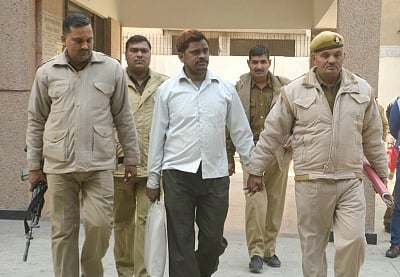Why India’s Nithari ‘House of Horrors’ case still haunts the country — and why many say justice was denied
Police found skulls, bones, and body parts belonging to women and children near a home

Dubai: Surender Koli, the main accused in the 2006 Nithari serial killings, was released from Kasna Jail in Greater Noida at 7.30 pm on November 13. For two decades, he carried the label of a “cannibal” who allegedly lured children to his employer’s home, killed them, and disposed of their remains.
His release has reopened the central question: was justice denied—to the children, to their families, or to Koli himself? Here's an explainer into one of India's most gruesome crimes ...
Q: What is the Nithari case?
The Nithari case refers to a series of killings uncovered in December 2006 in Noida, a suburb of Delhi. Police found skulls, bones, and body parts belonging to women and children near bungalow D5, a home in the upscale neighbourhood of Nithari.
The bungalow belonged to businessman Moninder Singh Pandher. His domestic worker Surinder Koli also lived and worked there. Both were arrested after body parts were recovered from drains and sewers close to the house.
Q: Why is the case back in the news now?
Because Surinder Koli, the last of the two convicted men, has been acquitted. On 12 November 2025, India’s Supreme Court overturned his final conviction, ruling that his confession was not voluntary. The judges said the confession—containing graphic admissions of cannibalism and necrophilia—was extracted while he was in custody for about 60 days, adding that it appeared he was being “tutored” and that investigators were present nearby.
Q: How many people were believed to be killed?
The investigation formally identified 19 victims.
Local residents, however, claim the number could be higher, based on the remains they personally helped recover from drains.
Q: What triggered national outrage at the time?
Residents had been reporting missing children for more than two years.
Families from the nearby slums of Nithari, mostly migrant labourers, accused police of dismissing their complaints. Parents say officers repeatedly told them—even when their daughters were 8 or 10 years old—that the children had “run away with lovers." The case exposed a class divide: the crimes occurred beside wealthy homes, while the victims came from the poorest neighbourhood next door.
Q: Were the two men convicted?
Yes.
Both Pandher and Koli were convicted in multiple cases of rape and murder and handed death sentences. Koli, at one point, faced 13 death sentences in separate cases. Pandher was charged in several as well.
Q: What happened to those convictions?
Over time, the verdicts collapsed:
2023 — The Supreme Court acquitted Moninder Singh Pandher, ruling the evidence was insufficient.
2010–2024 — Various courts overturned multiple convictions against Koli.
November 2025 — The Supreme Court cleared the final case against Koli.
Koli has now been acquitted in all cases.
Q: What did the Supreme Court say about the investigation?
The judges were explicit and critical. They said earlier courts relied largely on Koli’s confession, which they did not believe was voluntary.
The order said the investigation was marked by:
negligence and delay
failure to pursue leads
overreliance on confessions
demonising a poor servant
The Court also pointed to ignored evidence, including an organ-trafficking angle flagged by a governmental committee under the Ministry of Women and Child Development. At the time, reports suggested some bodies were cut with surgical precision, but investigators did not follow that line of inquiry.
Q: What do Koli and Pandher say?
Pandher has publicly maintained his innocence. Koli has not spoken since leaving prison, but his lawyer, Yug Mohit Chaudhry, told the PTI news agency that “every bit of evidence was fabricated,” that Koli was “framed to protect some powerful person,” and that “the real culprit was known to investigators.” The CBI has not commented on the acquittal.
Q: How are families reacting?
With anguish and disbelief. Many parents, interviewed by the BBC, do not understand how two men convicted for nearly two decades can now walk free. They are asking the same question:
“If Pandher and Koli didn’t do this, then who killed our children?” Some parents describe losing closure they had forced themselves to accept.
Father Jhabbu Lal Kanaujia, whose 10-year-old daughter Jyoti was among the victims, says he burned all case documents when he heard of Koli’s acquittal. He helped pull remains out of the sewer in 2006, and insists the number of skulls recovered was “many times higher” than the 19 cases that went to court.
Q: What role did police failures play?
Families say police repeatedly ignored them.
When 8-year-old Rachna disappeared in 2006, police allegedly told her father Pappu Lal she had “eloped with a lover.” The family searched for months until remnants of her clothes and slippers were found behind D5. Public anger led to crowds storming the house and attacking police. Two senior officials were transferred; six officers suspended. Only then was the case handed to federal investigators. Residents say authorities acted only once the bones surfaced, not when people went missing.
Q: Can families still get justice?
Legally, avenues are nearly exhausted. The acquittals were issued by India’s highest court, leaving no higher forum to appeal to. A victims’ charity that assisted families says the process is effectively over. Some legal experts argue families could petition the Supreme Court to order a fresh investigation, but retired Justice Madan Lokur has said this is unlikely to succeed: too much time has passed, evidence has deteriorated, and critical leads were never preserved.
Q: What remains unresolved?
Everything that matters. Two men once publicly branded as monsters are now legally innocent. The investigation has been condemned as botched at multiple levels. The victims’ families are left with no answers to the most basic question:
If not them, then who killed the children of Nithari?
Network Links
GN StoreDownload our app
© Al Nisr Publishing LLC 2026. All rights reserved.